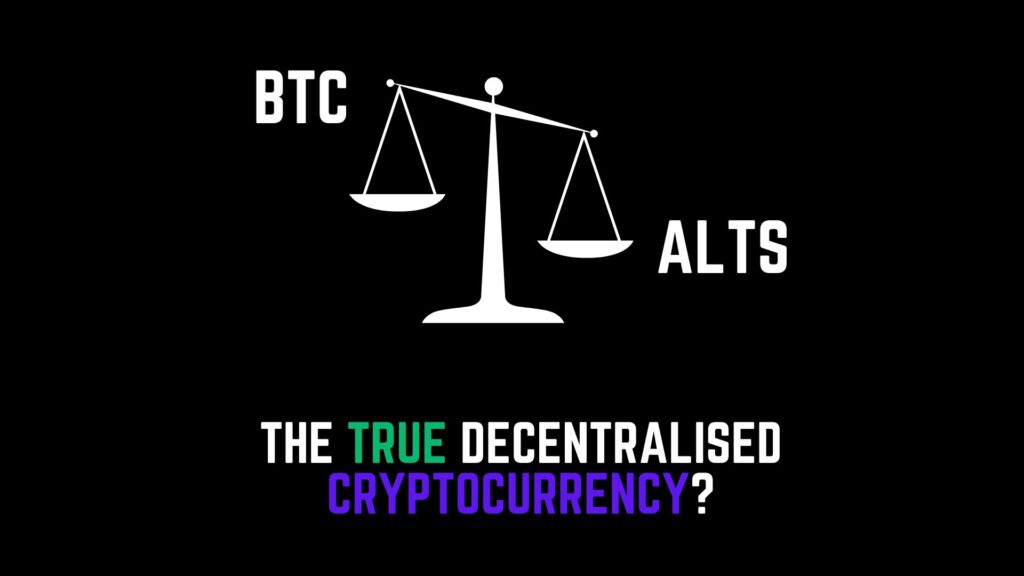Created in 2009 and Slowly gaining Steady Adoption, Bitcoin has came a long way. Created by an Unknown Developer Satoshi Nakamoto, this astounding piece of digital innovation has inevitably shaped and still shaping the Future of Finance, and Spending as a Concept. With over $100,000+ Per single Unit Achieved ATH in Year 2025, Bitcoin is definitely breaking New grounds.
Cryptocurrency As a Whole is more than just “Digital Money” to most Adopters and Users out there, rather it’s a Way of Having a “True” Custody of Your Own Hard-Earned Money Money without some major RISKs. Of course if some certain rules are Accurately followed. Having Your Own Money in a Piece of computer and getting to have the final SAY Over it is considered DECENTRALISATION!
Talking about Successful Adoption, Big entities like BLACKROCK, are massively Adopting BTC. Including Countries like EL SALVADOR.
What is Decentralisation?
To understand why Bitcoin is seen as the true decentralised cryptocurrency, it’s essential to define decentralisation in the context of digital currencies. Decentralisation refers to the distribution of control, management, and governance across a network, without reliance on a central authority or intermediary.
For traditional financial systems, decentralisation implies the absence of central banks or government-controlled institutions overseeing transactions. In the case of cryptocurrencies, decentralisation is often viewed as the degree to which a network is resistant to control or manipulation by a single party, organisation, or individual.
BITCOIN VS OTHER CRYPTOCURRENCY: A DEBATE OF DECENTRALISATION
Bitcoin: The First Truly-Decentralised Cryptocurrency
There are a few Key factors that cements BTC as untouchable over other cryptocurrencies Available right now.
1. Proof-of-Work (PoW) Consensus Mechanism
This Mechanism relies on miners solving complex mathematical puzzles to add blocks to the blockchain, is one of the core reasons it remains decentralised. It ensures that no single participant or entity can control the network by gaining a majority of the computing power (hashrate). This makes Bitcoin’s blockchain remains highly resistant to censorship and manipulation.
2. ABSENCE OF CENTRAL AUTHORITY
BTC operates on peer-to-peer network, meaning there’s no central authority governing the it. This peer-to-peer nature is fundamental to Bitcoin’s decentralised ethos. Every participant in the network has an equal role in validating transactions and maintaining the integrity of the blockchain.
- Transparent Ledger
The Bitcoin blockchain is immutable, meaning once a transaction is recorded, it cannot be changed or reversed. This immutability, combined with the transparency of the blockchain, ensures that the system is not subject to the whims of any central authority. Anyone can view the transactions on the blockchain, but no one can alter them without an enormous amount of computing power.
4. Global Consensus and Security
Bitcoin’s security is further bolstered by the global distribution of its nodes. These nodes ensure that the network reaches consensus on the validity of transactions and the state of the ledger. Because no single entity controls the majority of nodes, the network is highly resistant to attacks or malicious changes.
Altcoins: Later Cryptocurrencies that are Centralised/Decentralised.
Alton translates to a wide Array of cryptocurrencies, each with its unique features and goals. While many altcoins attempt to replicate Bitcoin’s decentralisation principles, they often diverge in key ways, leading to varying degrees of centralization or lack of true autonomy.
1. Proof-of-Stake (PoS) and Other Consensus Mechanisms
Many altcoins, such as Ethereum (ETH), have shifted from Proof-of-Work to Proof-of-Stake (PoS) or other consensus mechanisms. While PoS can be more energy-efficient than PoW, it can also introduce centralisation risks. In PoS systems, the more coins a user holds, the greater their chances of validating transactions and earning rewards. This can result in a concentration of power among a small group of wealthy holders, potentially undermining the decentralisation ethos.
For example, Ethereum’s transition to PoS (via the Ethereum 2.0 upgrade) has led to concerns about the influence of large staking pools or entities controlling significant portions of staked Ether. This could reduce the network’s overall decentralisation by consolidating control into the hands of fewer players.
2. Development and Governance
In some altcoin projects, the development process and governance structure may be more centralised than Bitcoin’s. Many altcoins have a core development team or foundation that makes key decisions about protocol upgrades, security improvements, and the overall direction of the project. While community input is often encouraged, the final decision-making power can rest with a small group of individuals or organizations.
In contrast, Bitcoin’s governance model is decentralised. Decisions about Bitcoin’s protocol upgrades, for example, are made through an open, transparent process involving proposals like BIPs (Bitcoin Improvement Proposals) and consensus from the network participants. This avoids the concentration of power and influence that can be seen in some altcoin projects.
3. Centralisation Risks in Governance
Another concern for certain altcoins is their reliance on centralised entities for development, funding, or promotional efforts. For instance, projects backed by venture capital or large corporations may prioritise the interests of these investors over the broader community. This can create a situation where the direction of the project is influenced more by the whims of a few powerful stakeholders rather than the decentralised collective.
Why Bitcoin Is Still the True Decentralised Cryptocurrency
While many altcoins offer unique features, scalability solutions, or use cases beyond what Bitcoin was originally designed for, they often fall short in terms of true decentralization. Bitcoin’s extensive global mining network, immutable blockchain, and robust consensus mechanisms make it the most decentralised cryptocurrency.
For many in the cryptocurrency community, the value of Bitcoin goes beyond its potential as a store of value or digital gold. It embodies the philosophical principles of decentralization, freedom from censorship, and financial sovereignty.
Although altcoins like Ethereum, Cardano, and Solana have made strides in terms of technological advancements, Bitcoin’s unwavering commitment to decentralization—without the interference of powerful centralized entities or developers—remains its most defining feature.
In a world where digital currencies and blockchain technology continue to mature, Bitcoin will likely continue to serve as the benchmark for decentralization, providing a resilient, secure, and truly decentralized alternative to traditional finance.
Get started with AI Automated Crypto trading on DEFI and CEFI here



